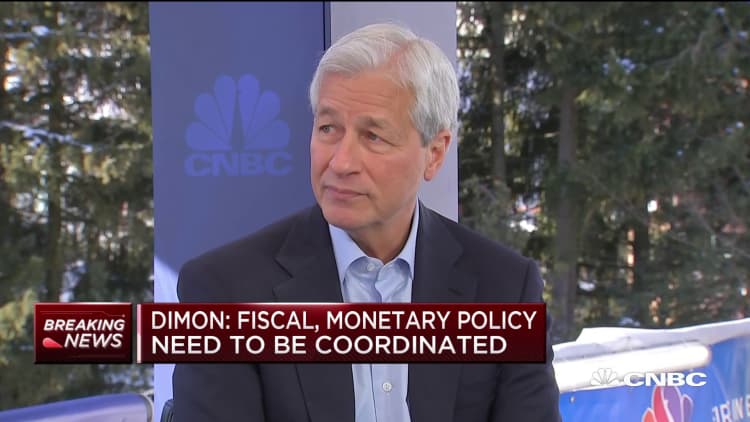
J.P. Morgan Chase CEO Jamie Dimon said Wednesday the only financial market bubble he sees right now is in government red ink.
At the World Economic Forum in Davos, Switzerland, CNBC's Andrew Ross Sorkin asked Dimon if he sees any frothy areas in the market.
"Only in sovereign debt," the bank chief responded.
The U.S. government released eye-popping deficit numbers as recently as last week that showed the federal budget deficit is on course to cross $1 trillion in fiscal 2020.
The government ran a deficit of $357 billion in the fiscal quarter ending in December and is on track to reach $1 trillion this fiscal year for the first time since 2012.
The total U.S. public debt outstanding stands above $23 trillion, with debt held by the public north of $17 trillion.
But Dimon added that historically low interest rates around the world have kept markets not only calm amid rising levels of debt, but that negative interest rates as seen in Europe are further proof that investors could be overpricing government debt.
"Right now people think central banks around the world can do whatever they want. They can't," he continued. "They're intelligent, looking at all the facts trying to figure out what to do. But [inflation] would be the big negative surprise."
If inflation unexpectedly shot higher, it could force central banks to hike interest rates to help cool down the economy. But that would also make government borrowing significantly more expensive. Bond prices rise as yields fall.
"I think it's very hard for central banks to forever make up for bad policy elsewhere. And that puts them in a trap," Dimon said. "Do you know anyone who's actually bought a negative interest rate bond?"
"I would never buy a negative rate bond. Not unless I was forced," he added. "In history, whenever you see something like that, it doesn't necessarily end well."
Dimon has led New York-based firm since 2005, navigating it through the financial crisis and managing it into the biggest U.S. bank by assets.


